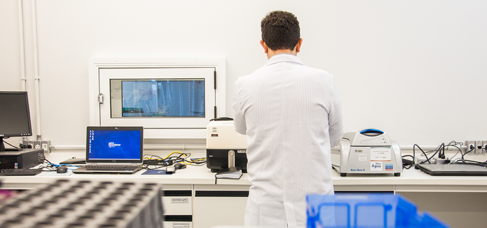The Master's Degree in Virology has as main objective to promote the formation of highly qualified personnel in the area of virology, with an interdisciplinary perspective, in order to meet the social demands of animal, human and environmental health scopes, considering epidemiological and sociodemographic contexts.

Concentration Area: Virology
Virology is considered in its broad sense, covering aspects of biology, epidemiology, diagnosis, treatment and development of control strategies of viruses and viroses in animal species, human beings and the environment.
Goals
- to qualify highly qualified professionals for teaching and research in virology, emphasizing the articulation with local health institutions and companies.
- to train human resources personnel in the various areas of virology to act in identifying and solving problems related to animal, human and environmental health
- to produce knowledge in the field of virology that contribute to technological innovation, the development of the country and the improvement of health services.
Target Audience
Graduates in Veterinary Medicine, Biomedicine, Pharmacy, Biological Sciences, Medicine, Dentistry and related areas.

AREAS OF EXPERTISE AND PROFESSIONAL PROFILE
The graduate of the master’s course in Virology must be able to:
- Develop teaching and research activities in the field of Virology, interacting with other areas of knowledge;
- Act in the academic and professional environment as a promoter of the process of generating new scientific and technological knowledge in the field of Virology;
- Employ scientific knowledge to solve problems related to Human, Veterinary and Environmental Virology.
Background
The Master's Degree in Virology was developed with the purpose of meeting a national demand for training in the specific field of Virology, with a focus on Universal Health and research aimed at diagnosis and tool development for viral diseases prevention and therapy. The course is also intended to discuss viruses and environmental issues. Professors have been working in an integrated way prior to the course proposal and have research production pertinent to the area of emphasis. This qualification establishes points of convergence between different areas of Virology, as well as investigates and answers questions of basic science, pathogenesis, monitoring, molecular epidemiology, drug development and immunobiologicals to study and combat viruses and viral infections. The course was approved by the Coordination of Improvement of Higher Level Personnel (CAPES), recommended at the 167th CTC-ES Meeting, and began its academic activities in the first half of 2017.
Fields of Research
Diagnostic Virology
The field of research Diagnostic Virology aims to determine the presence and impact of viruses in biological and environmental samples by using and developing classical and advanced viral diagnosis methodologies.
Developments in Virology
The field of research Developments in Virology focuses on the solution of emerging problems and on innovation in the search for new therapeutic and immunobiological alternatives for the control of viral infections in animals and humans, as well as for disinfection and impeding dissemination of viruses in the environment.
Coordination committee
Coordinator: Juliane Deise Fleck.
Substitute Coordinator: Ana
Luiza Ziulkoski.
Full Faculty Representative: Matheus
Nunes Weber.
Full Faculty Representative: Márcia
Regina Loiko.
Alternate Faculty Representative: Simone Ulrich Picoli.
Student Representative: Larissa Mallmann.
Self-evaluation Committee
Teaching Representative: Juliane Deise Fleck, Fernando Rosado Spilki e Simone Gasparin Verza.
Student Representative: Ana Karolina Antunes Eisen.
Egress Representative: Fernando Jardim.
Admnistrative Technician Representative: Jordana de Oliveira.


